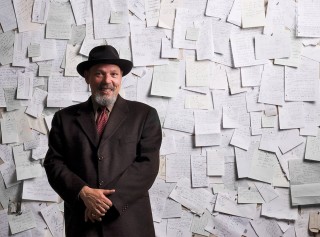Title

August Wilson's Seven Guitars will be presented by the Juilliard fourth-year actors.
(Photo by David Cooper)Part of August Wilson’s groundbreaking 10-play American Century Cycle (also known as the Pittsburgh Cycle) comes to Juilliard this month when the fourth-year actors present Seven Guitars, which depicts the 1940s. Drama faculty member Shana Komitee spoke to the director, Timothy Douglas, about the play and its influence.
Body
Why were you excited to direct Seven Guitars?
After Seven Guitars, I’ve got one to go before I can join the club of those having directed all 10 [plays in the cycle]. There are resonances now that are all over the play, simply because of what America is finally having to look at with race relations—specifically with black men.
You were a Yale School of Drama student when the first of these plays premiered at Yale in the early 1980s. What was that like?
He wasn’t “August Wilson” yet! We didn’t know [how legendary he would become]. We just knew that his was an extraordinary new storytelling voice.
What will it be like for our actors to encounter Wilson’s language and characters?
In institutions of training, at least all the ones where I’ve been, for black actors this is really the first time they get to play [characters so close to home]. So what often happens is, whether the actors know it or not, there’s just an innate connection to the African rhythm. So you start “speaking August Wilson,” and you’re like, “Whoa, hey, wait a minute now!” They are almost confused by how fast they get it.
What’s the function of blues music in Seven Guitars?
The blues is an example of how the African nature is always kicking up within us. It has this wonderful chameleon ability to arise in whatever particular culture we’re in. But it’s the result of a much deeper, underground, free-flowing well. So even though this play is dealing specifically with the blues, I’m not stopping there. There’s so much more that can be heard now, given the zeitgeist around race.
Is there anything in the play the audience might not immediately get?
Perhaps Hedley’s [Pan-Africanist] worldview. Hedley [who rejects any collaboration with white society] is driven by the African warrior nature that never got “civilized” out of us. Part of the explanation for his behavior is cultural, his coming from the islands. Black men/people who were not born and/or raised in this country benefit from being unencumbered by a “slave mentality.” This is the fundamental ideological difference between Hedley and Floyd [who is willing to work with white businesspeople to achieve the so-called American dream of upward mobility].
Is that what causes their final showdown?
Yes. It feels as Greek-ly inevitable to me as Oedipus killing his father ... it’s divinely ordained. Floyd, as part of his plan [to go make a hit record in Chicago] needs the white man. But to Hedley, emancipation comes from being driven purely by one’s authentic African self. The Floyds of the world—black men who are willing (consciously or not) to subjugate themselves to those who enslaved them—are “holding the race back.” They are gangrene on what is otherwise a highly functioning body. So Hedley has to kill Floyd’s human nature—to release his spirit. Both men are visionaries. On the surface they want the same [things]—power, influence, freedom, and actualization—but their approaches are wildly different.
What will white audiences get from the play?
It’s an American play. And because of our current time period, I feel there’s a greater hunger to understand the motivations of black people. Collectively, as Americans, we’re looking at the problem of race in an augmented way. As that consciousness grows, more is revealed about August’s plays. But plays have always been there. In the same way that Shakespeare reflects every time period in which he’s performed. August has that depth and that breadth. The play hasn’t done anything different, it’s what we now bring to it.





